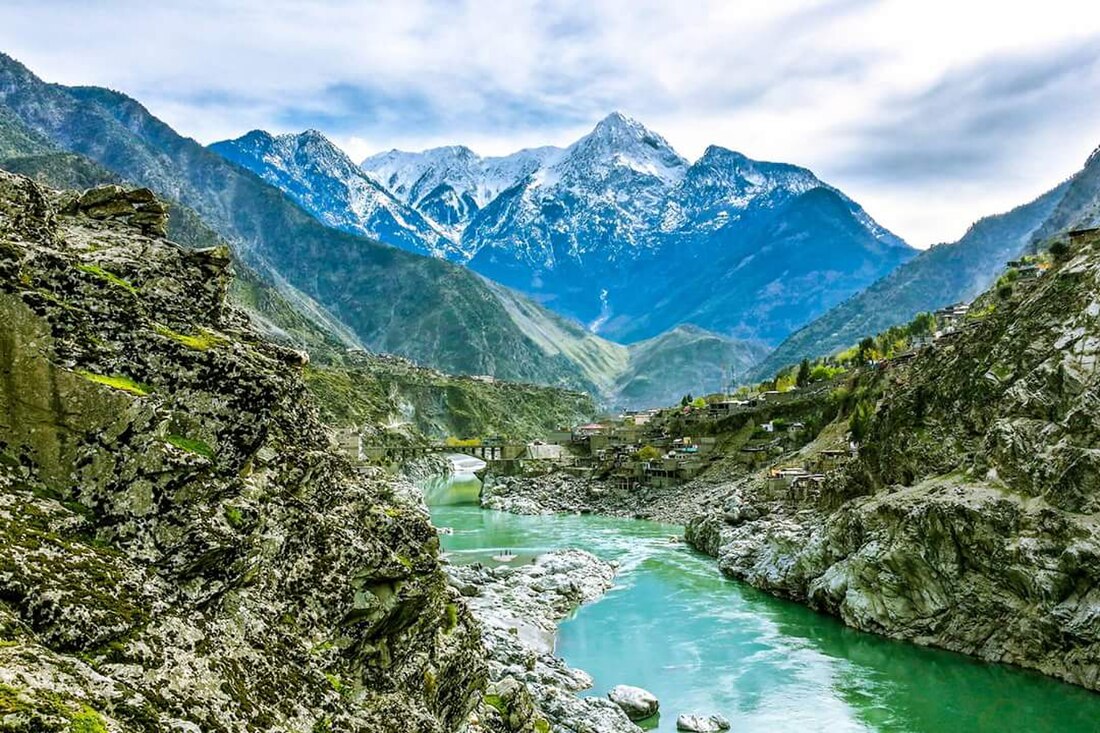Kohistan District, Pakistan
District in Khyber Pakhtunkhwa, Pakistan From Wikipedia, the free encyclopedia
Kohistan District, also known as Indus Kohistan (Kohistani: سندھُ کوستَیں)[2][3] and Hazara Kohistan,[4] was a former District within the Hazara Division of Khyber Pakhtunkhwa, Pakistan. Consisting of eastern portion of the larger Kohistan region, it was bifurcated into two districts in 2014: Upper Kohistan and Lower Kohistan. In 2017, the Lower Kohistan District was further bifurcated and a district Kolai-Palas was established.[5][6] It has an area of 7,492 square kilometres (2,893 sq mi) and a population of 472,570 according to the 1998 Census.[7]
Indus Kohistan
کوہستان | |
|---|---|
 | |
 Location of the former Kohistan District (highlighted in red) in Pakistan | |
| Coordinates: 35°15′N 73°30′E | |
| Country | Pakistan |
| Province | Khyber Pakhtunkhwa |
| Division | Hazara |
| Established | 1 October 1976-2014 |
| Headquarters | Dasu |
| Area | |
| • Total | 7,492 km2 (2,893 sq mi) |
| Population (2017)[1] | |
| • Total | 784,711 |
| • Density | 100/km2 (270/sq mi) |
| Time zone | UTC+5 (PST) |
Geographically, Kohistan stretched from Gilgit-Baltistan in the north to the Mansehra District in the east to the Battagram District and Shangla and Swat districts in the west.[8]
Geography
The district lies between 34° 54′ and 35° 52′ north latitudes and 72° 43′ and 73° 57′ east longitudes.[8] It was bounded by the Diamer District of Gilgit-Baltistan in the north, Manshera District in the southeast, Kaghan Valley of the Mansehra District in the southeast , Battagram District in the south and Shangla and Swat Districts in the west .[8]

Kohistan is the point of convergence for the Hindukush, Karakorum, and Himalayan mountain ranges, acting as a natural boundary delineating distinct environmental regions within the expanse of the Himalayas, Karakoram, and Hindu Kush mountain chains.[8] This uniqueness of the mountain system also results in rich flora and fauna, thus providing a habitat for unique species such as the Western Tragopan pheasant and the snow leopard.[8]
Education
The literacy rate of the district among the population aged 10 years and older is 11.1%: male 17.23% and female 2.95%. The proportion of the working or employed population to the population aged 10 years and older is 26.47%, which is 70.53% of the total labour force. Out of the total employed population, 71.60% are self-employed, 10.68% work as employees, and 17.32% are unpaid family helpers.[citation needed]
Kohistan's literacy rate is among the lowest in Pakistan and hovers around 20%.[9] It has the lowest Human Development Index of all districts in Khyber Pakhtunkhwa.
Demographics
| Year | Pop. | ±% p.a. |
|---|---|---|
| 1951 | 18,775 | — |
| 1961 | 54,452 | +11.24% |
| 1972 | 84,826 | +4.11% |
| 1981 | 147,635 | +6.35% |
| 1998 | 280,666 | +3.85% |
| 2017 | 784,711 | +5.56% |
| Sources:[10] | ||
At the time of the 2017 census the district had a population of 784,711, of which 424,643 were males and 360,055 females. The rural population was 706,433 (97.95%) while the urban population was 72,654 (2.05%). The literacy rate was 76.20% - the male literacy rate was 86.40% while the female literacy rate was 65.76%. 3,172 (0.24%) people in the district were from religious minorities, mainly Christians.[11]
At the time of the 2017 census, 91.96 of the population spoke Kohistani, 7.09% Pashto, 0.36% Urdu and 0.63% Punjabi as their first language. 2.07% of the population spoke languages classified as 'Others', mainly Kohistani languages.[11]
The major language of the area is Kohistani, which in the 1981 census, was the mother tongue of 92% of households.[12] The variety spoken in the District of Kohistan has formed the basis of a literary language.[13] It is very close to the Dardic Language of Kohistan: the two share 86% of their basic vocabulary.[14]
Other languages, such as Pashto, Urdu and Punjabi, are found more in urban than rural areas.
See also
References
Wikiwand in your browser!
Seamless Wikipedia browsing. On steroids.
Every time you click a link to Wikipedia, Wiktionary or Wikiquote in your browser's search results, it will show the modern Wikiwand interface.
Wikiwand extension is a five stars, simple, with minimum permission required to keep your browsing private, safe and transparent.
